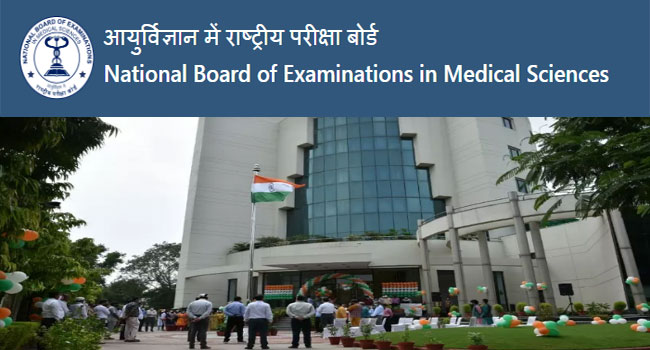NBEMS: In the evolving landscape of healthcare in India, the National Board of Examinations in Medical Sciences (NBEMS) has emerged as a cornerstone institution responsible for shaping, standardizing, and accrediting postgraduate medical education. As India aims to address the growing demand for skilled healthcare professionals and to elevate the quality of medical training to international standards, NBEMS stands at the forefront, ensuring that both public and private institutions adhere to consistent benchmarks of excellence.

What is NBEMS?
The NBEMS, formerly known as the National Board of Examinations (NBE), is an autonomous body under the Ministry of Health and Family Welfare, Government of India. It was established in 1975 with the core mandate of improving the quality of medical education by conducting high-standard postgraduate and postdoctoral examinations in modern medicine. In 2021, it was renamed to reflect its expanded scope and emphasis on not just examinations but also broader medical science accreditation and development.
Key Objectives of NBEMS
NBEMS operates with a clear vision and multiple objectives that contribute directly to India’s healthcare education framework:
- Standardization of Postgraduate Medical Education: NBEMS develops and maintains uniform standards across institutions offering postgraduate medical education.
- Conduct of Examinations: It conducts examinations like the DNB (Diplomate of National Board) and FNB (Fellowship of National Board), which are equivalent to MD/MS and DM/MCh degrees respectively.
- Accreditation of Training Institutions: NBEMS evaluates and accredits hospitals and institutions across India to run DNB and FNB programs, ensuring infrastructure, faculty, and clinical load meet defined criteria.
- Capacity Building: Through its programs, NBEMS contributes significantly to addressing the shortage of specialists in India, especially in rural and underserved areas.
NBEMS-Accredited Programs: Expanding Access to Quality Education
One of the major contributions of NBEMS is the democratization of medical education through the DNB and FNB programs. Unlike traditional postgraduate programs which are mostly limited to medical colleges, NBEMS allows corporate hospitals, trust-run institutions, and district hospitals to participate in medical education by becoming accredited centers.
This approach has several advantages:
- Decentralized Education: DNB programs allow specialist training to reach beyond metro cities and into tier-2 and tier-3 cities.
- Practical Exposure: Students receive hands-on training in busy hospitals, often with better patient load and case variety than some medical colleges.
- Equal Recognition: After legal and regulatory changes, DNB degrees are now treated on par with MD/MS degrees for teaching and specialist roles, provided certain conditions are met.
Technological Integration and Modernization
NBEMS has also embraced technology to ensure transparency and efficiency. It conducts various entrance and exit exams using computer-based testing (CBT), including:
- NEET-PG: Entrance exam for MD/MS and DNB postgraduate courses.
- NEET-SS: Super-specialty entrance exam for DM/MCh and FNB programs.
- FMGE (Foreign Medical Graduate Examination): Screening test for Indian citizens with foreign medical degrees.
- DNB Final Examinations: Assessments for DNB candidates before certification.
The implementation of digital platforms for application, evaluation, and result processing has brought credibility and convenience to the process, further reinforcing the role of NBEMS as a modern regulatory body.
NBEMS and Regulatory Alignment
NBEMS functions alongside other major medical regulatory bodies like the National Medical Commission (NMC). While NMC is responsible for undergraduate education and overall regulation, NBEMS specifically focuses on postgraduate and super-specialty education and accreditation. Their coordinated efforts help streamline the medical education pipeline from MBBS to specialization.
Challenges and Future Roadmap
While NBEMS has made significant strides, it faces ongoing challenges, including:
- Faculty Shortage: Some DNB centers lack qualified faculty compared to traditional medical colleges.
- Awareness and Perception: Despite official recognition, DNB degrees still face perception challenges among some employers.
- Infrastructure Variability: Ensuring uniformity across diverse training centers remains a work in progress.
To address these, NBEMS has outlined several forward-looking initiatives:
- Regular audits and stricter accreditation criteria.
- Expansion of FNB programs in emerging specialties.
- Enhanced faculty development workshops.
- AI-based evaluation tools for assessments.
Conclusion
The NBEMS has established itself as an indispensable pillar of India’s medical education system. By enabling a wider pool of institutions to train medical specialists, ensuring standardization, and conducting rigorous assessments, NBEMS plays a crucial role in enhancing healthcare delivery nationwide. As India continues to push toward universal health coverage and improved patient care standards, NBEMS will remain the backbone of medical accreditation in India, fostering a future-ready cadre of medical professionals.
Also Read: OJEE Results 2025














